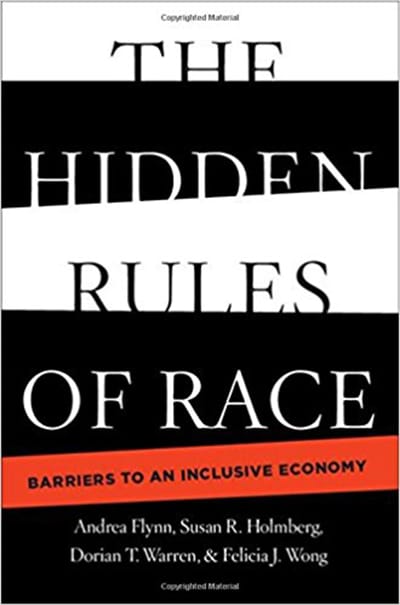The Hidden Rules of Race
by Kathy Grear 11/15/2017Roosevelt Institute: Roosevelt Institute, Cambridge University Press Release Book On Racial Inequality
Book Focuses On Ways Economic Laws and Policies Reinforce Systemic Racial Disparities
NEW YORK, NY – Earlier today the Roosevelt Institute and Cambridge University Press released The Hidden Rules of Race: Barriers to an Inclusive Economy. This book explains how historic racial exclusions in law and policy (the “rules”) continue to shape our economic realities and prevent the United States from achieving a fully inclusive, growing, and vibrant economy.
Hidden Rules arrives as debates over racial inequality and economic inequality are at a fever pitch in the United States. In these debates, both race and economics are often actively pitted against one another, as though one, and not the other, should be the priority for advocates and policymakers. This is a false choice—and one that is not new in American political history, but has renewed relevance today.
This book shows the ways racial inequality and economic inequality are inextricably linked throughout American history and in the realities of the current political moment. Broadly, the book explains why making progress on either issue requires taking on and addressing both. It also specifically shows how race-based rules have harmed communities of color and led to disparities ranging from wealth creation, education, health care, and criminal justice.
“Economic health and racial equality are two sides of the same coin, not an either-or proposition,” said Felicia Wong, President and CEO of the Roosevelt Institute and the book’s co-author. “Any vision or plan to truly improve the economic lives of working people cannot be race-blind; we must account for race precisely because of the ways in which racial exclusions have been baked into our policies and politics. And any approach to bringing about greater racial justice must have a clear, bold economic dimension that goes well beyond what the political class is currently offering.”
“Hidden Rules is a welcome addition to the discussion about how we can both understand and alter the long American trajectory of racial inequality,” said Sandy Darity, the renowned scholar and economist based at Duke University. “For far too long, policymakers and researchers either have ignored or grossly—and perhaps intentionally—misanalysed the reality that is presented with such clarity in this book. This reality is tragically enduring, and its pernicious results include the stubborn persistence of the racial wealth gap, a ‘hidden’ but insidious force that damages the prospects and well-being of millions of Americans of color. We cannot hope to remedy this situation if we don’t speak honestly about what created it. This book can greatly inform and facilitate that conversation.”
“While many communities are hurting economically, we must acknowledge how the economy has disproportionately failed and continues to fail communities of color,” said Andrea Flynn, a Fellow at the Roosevelt Institute and the book’s co-author. “Racial inequality is not inevitable and it is not an accident of history. It is a choice we have made with our politics and our policies. For more than two centuries our policymakers have written rules that have created patently unequal life chances for people of color. This book illustrates the depth and breadth of those rules, the impact they have had on black Americans and reminds us of moments in history when we rewrote our rules to create a more fair and inclusive country.”
“The status of people of color are the ‘Miner’s Canary’ for the overall health of American democracy. And the rules of our economy and society directly affect the life chances and opportunities for communities of color,” said Dorian Warren, a Fellow at the Roosevelt Institute and the book’s co-author. “There are many important ways that ‘we the people’ can fight for justice in the United States, but at its heart, the fight for a more just and equitable America has always hinged on expanding who is truly considered an American, on who has a real chance at knowing inclusion, opportunity and security. This book helps to clarify that fight by explaining how a colorblind economic vision, or a sole focus on racial justice without economic justice, will both inevitably fail. These two fights are far too bound up in one another to be confronted piecemeal. Hidden Rules is a powerful guide for understanding our society and economy and how to make them both work better for everyone.”
The Hidden Rules of Race: Barriers to an Inclusive Economy
Why do black families own less than white families? Why does school segregation persist decades after Brown v. Board of Education? Why is it harder for black adults to vote than for white adults? Will addressing economic inequality solve racial and gender inequality as well? This book answers all of these questions and more by revealing the hidden rules of race that create barriers to inclusion today. While many Americans are familiar with the histories of slavery and Jim Crow, we often don’t understand how the rules of those eras undergird today’s economy, reproducing the same racial inequities 150 years after the end of slavery and 50 years after the banning of Jim Crow segregation laws. This book shows how the fight for racial equity has been one of progress and retrenchment, a constant push and pull for inclusion over exclusion. By understanding how our economic and racial rules work together, we can write better rules to finally address inequality in America.
Authors: Andrea Flynn, Susan R. Holberg, Dorian T. Warren & Felicia J. Wong
Series: Cambridge Studies in Stratification Economics: Economics and Social Identity
Hardcover: 221 pages
Publisher: Cambridge University Press (September 8, 2017)
[arve url=”https://www.youtube.com/embed/reTskvWvodc?rel=0&showinfo=0″ align=”center” /]
The Samuel DuBois Cook Center on Social Equity at Duke University partnered with the Roosevelt Institute and the Brookings Institution’s Richard Reeves for a conference on October 26, 2017 entitled “The Hidden Rules of Race and Dream Hoarders: A Conference Exploring the Historical and Contemporary Landscape of Race, Wealth, and Health Disparities in the United States.” The conference explored the underpinnings of health and wealth disparities in the context of race, looking at issues that go beyond the current national emphasis on the trials of the white working class.
Additional videos:
- Andrea Flynn
- Dorian Warren
- Felicia Wong
- Susan Holmberg
Andrea Flynn
Andrea Flynn is a fellow at the Roosevelt Institute, where she researches and writes about race, gender and the social and economic issues that impact women and families. Her writing has appeared in The Atlantic, The New Republic, Cosmopolitan, Salon, The Hill, and Women’s eNews.
Dorian Warren
Dorian T. Warren is a Fellow at the Roosevelt Institute, an MSNBC Contributor, and Board Chair of the Center for Community Change, Washington, DC. His forthcoming book is entitled The Three Faces of Unions: Inclusion and Democracy in the US Labor Movement.
Felicia J. Wong
Felicia J. Wong is President and CEO of the Roosevelt Institute, where she leads work on Roosevelt’s comprehensive economic program and narrative to rewrite the rules. She is a political scientist with expertise in race and education politics, and has held senior executive roles in the private and nonprofit sectors. She has also served as a White House Fellow.
Susan R. Holmberg
Susan R. Holmberg is a Fellow at the Roosevelt Institute. She writes on inequality, climate change, and corporate governance issues. Her writing has appeared in Democracy Journal, The Atlantic, Salon, The Hill, and Grist.
‘The Hidden Rules of Race shines an objective light on the discriminatory systems and structures that perpetuate disparities between black and white Americans. The authors’ call for a comprehensive reorientation of our perspective on economic and racial inequality is bold, timely, and deeply necessary for those of us who wish to build a more inclusive future.’ – Darren Walker, President, Ford Foundation
‘Anyone focused on social change knows that there are a set of written and unwritten rules that incentivize and fortify the status quo. The work of social change – the work of undoing racism – is changing those rules. In The Hidden Rules of Race, the team at Roosevelt has created a clear and actionable analysis, instrumental to identifying some of the most important interventions we can make, and to help us do the work better.’ – Rashad Robinson, Executive Director, Color of Change
‘Race matters. As our racial landscape dramatically changes, we must pay more attention to the racial inequities that continue to plague many communities of color. In The Hidden Rules of Race, we get a roadmap to why and how we must rewrite the racial rules in order to pave the way for racial and economic justice.’ – Deepa Iyer, Senior Fellow, Center for Social Inclusion
‘For too long, efforts to combat racial inequalities have been pitted against efforts to combat economic inequalities, in ways that have only empowered those who benefit from both. The authors of The Hidden Rules of Race show how in virtually all spheres of American life, the nation operates with explicit and tacit rules that perpetuate both race and class inequities. They advance proposals that should be central to national debates on how to pursue more truly equal rights and opportunities for all.’ – Rogers M. Smith, Christopher H. Browne Distinguished Professor of Political Science, University of Pennsylvania








No Comments so far
Jump into a conversationNo Comments Yet!
You can be the one to start a conversation.Only registered users can comment.